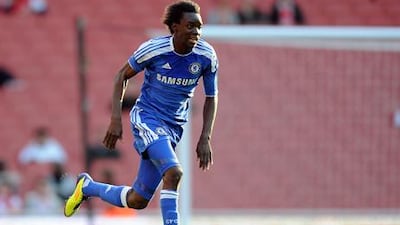Ivory Coast against Burkina Faso, tomorrow evening's Group B fixture in Malabo at the African Cup of Nations, is a West African derby with an edge.
The countries share a long border, a history of trade and immigration. Time was that workers from landlocked Burkina Faso moved in numbers to the wealthier state to the south.
Recent unrest in Ivory Coast has made that a journey to think twice about, but there remains a big-brother, little-brother dynamic between the nations.
It extends to the football field. A shy Bertrand Traore felt it when he turned up in London as a 15 year old, a prodigy invited for trials with Chelsea's academy.
Traore is a Burkinabe, from the second city of Bobo-Dioulasso, and on being introduced to members of the Chelsea first team at the club's training site, he found some friendly faces.
"He told me Didier Drogba and Salomon Kalou were looking after him," said Alain Troare, who has been looking after his younger sibling most of his life.
The Ivorians Drogba and Kalou will doubtless give the youngster a cool wave when they see him tomorrow, probably among the Burkina Faso substitutes.
Traore only turned 16 last September, a few days before he made his senior international bow and is hopeful he might make a piece of history and become the third youngest footballer ever to take the field at a Cup of Nations finals, a significant step perhaps on the way to persuading Chelsea, or another major European club, that they should pin him down to a professional contract when he reaches the age of 17.
Burkina Faso's Portuguese head coach Paulo Duarte said of him: "He has the potential to become one of the African game's great stars."
Duarte had a policy not to select players who are not commanding a regular place in their club teams, but made an exception naming Traore in his 23-man squad for the tournament.
He is essentially a wild-card pick, but if, after a 2-1 loss in their opening match against Angola, Duarte feels he needs to take a gamble to keep Burkina Faso involved in the competition, the teenager may well get his chance to be in the starting line-up or come off the bench.
Africa rather specialises in prodigies. Yet for every Samuel Eto'o, who became the youngest player at a World Cup and soared upwards from then on, there is a Nii Lamptey, who was a gem of the 1992 Olympic Games for Ghana at the age of 17, but was in decline by the time he turned 21.
So it would be hazardous to forecast boldly what become of Traore, with his charmed left-foot, his confidence on the ball and what is described as a mature and disciplined approach.
"He has kept his feet on the ground even with all the interest in him," said Alain, 23, who recalls the moment, last year, when the pair of them lined up together for their country.
"He came on in the second half and I just said to him 'Don't be nervous, just do what you do best'. He said: 'Don't worry about me,' and with practically his first touch he went on a great run."
In the sometimes treacherous passages undertaken by thousands of aspiring young footballers between Africa and Europe, fraternal bonds are often important.
Look only at the Ivory Coast, and how Kolo Toure helped smooth the way for Yaya Toure, or how Chelsea's Kalou made his prodigious start in European club football - he was at Feyenoord in Holland at 18 - partly because of the fine reputation established by his elder sibling, Bonaventure.
The Toures and the Kalous, and half a dozen more of the Ivorian squad rated favourites to win the 28th Cup of Nations, all developed their game at the fabled Asec Mimosas academy in Abidjan.
Across West Africa many clubs and would-be talent-spotters have tried to create similar schools of excellence, with the idea of the substantial transfer fees and high wages offered by European clubs in mind.
One of the more successful such schemes was born in Burkina Faso in the mid-1990s.
It was called Planete Champion, and it spread over some dusty land just off the road north out of Ouagadougou, the capital. Soon after it set up, offering schooling, accommodation and dedicated football tuition to selected teenagers, Paris Saint-Germain, the French club, invested in it, but subsequently pulled out of being involved a few years later.
The centre recently went into abeyance, but only after establishing a significant legacy. Alain Traore moved up from Bobo-Dioulasso to enrol there; the Burkina Faso and Rennes midfielder, Jonathan Pitroipa was a student.
Pitroipa, who joined Rennes from Hamburg in the summer, and Alain Traore, who launched Auxerre's current Ligue 1 campaign with a streak of goals, have been among the revelations in French domestic football during this season.
Bertrand Traore has trialled at Auxerre, too, thanks partly to his brother, but mainly because they, like Chelsea, wanted to see close up a footballer who impressed at the 2009 World Under 17 championships, when he was the event's youngest footballer, a 14 year old among players two or three years older.
He would be the outstanding individual in the Burkina Faso Under 17 team who won the 2011 African title. But between there and a career at the club of Drogba or Michael Essien, of Mikel John Obi or Kalou, is still quite a journey.

